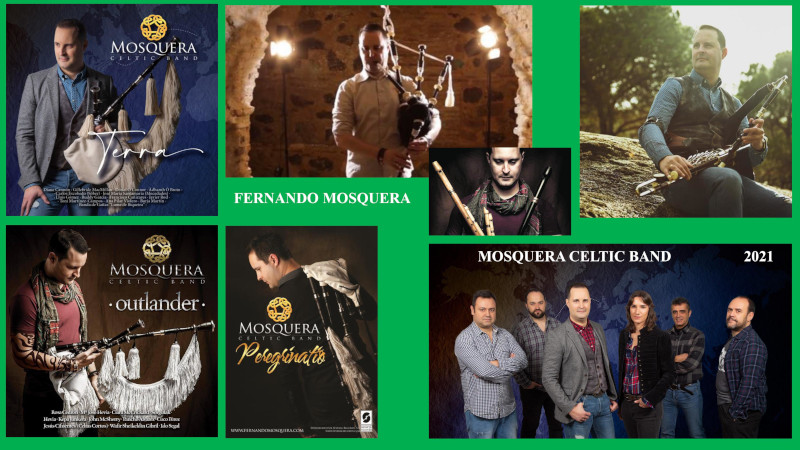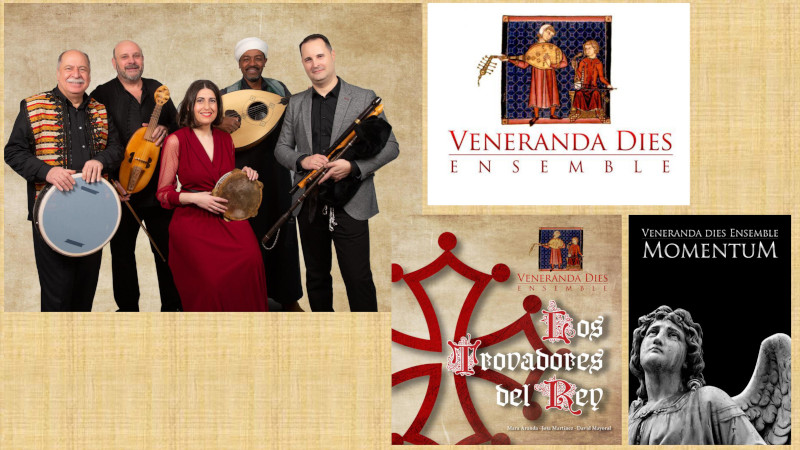
FolkWorld has known about the Spanish bagpiper FERNANDO MOSQUERA from his albums: 2011 ‘Peregrinatio’,[47] 2015 ‘Outlander’[57] & 2020 ‘Terra’.[74]
Although the music of his MOSQUERA CELTIC BAND begins in the folklore of Galicia (NW Spain), it has incorporated instruments and compositions that extend to the traditions from many other places. From his hometown in Toledo (Castilla—La Mancha region, central Spain), he also develops an alternative project on medieval music under the name VENERANDA DIES ENSEMBLE. A big part of his records have been published by the label Severalia, Several Records (www.severalia.com).
Today in 2021, Fernando Mosquera and his bands continue with their projects, fighting and adapting to this crisis of Covid19 pandemic. A global situation to be solved through complex vaccination campaigns, which seem to take time to come to light at the end of the tunnel (perhaps) until next year.
In the early 1990s, Fernando Mosquera started playing music at the age of eight, with a recorder at school, and harmonica and Galician tambourine at home with his father, who was born in Galicia but then living in Toledo. He also started self-learning other types of traditional percussions and Irish tin whistles. In those years, Fernando also travelled occasionally with his parents to visit other relatives who lived in Salamanca (Castilla y León region, western central Spain) and A Coruña (Galicia), for which he developed a deep interest in the summer folk music traditions from those areas. At some point he also learned to play the Galician bagpipes, and after that it was a non-stop journey to learn up to sixty different instruments.
Mosquera’s musical idols in those years were Spanish folk bands such as the classic Milladoiro, La Musgaña or Luar Na Lubre. We keep talking about the years just before the advent of DVD, the Internet, or cable TV in Spain, so he could barely manage to buy a few records (or rather cassette tapes), and to watch those artists on the rare occasions when they were broadcast on the Spanish TV channels.
On the other hand, Fernando was lucky enough to live in a great historic Castilian city such as Toledo, so he had the opportunity to appreciate a genre quite close to folk such as ancient, medieval or Renaissance music. Thanks to that he developed a parallel learning process in those other styles. And then in the late 1990s, perhaps as a spin-off of the 'Celtic tiger' years of the Irish economy, 'Celtic' music enjoyed a kind of 'boom' that in Spain was probably led by artists like the ‘gaiteiro’ bagpiper Carlos Nunez. Also at that time, concerts, CDs, new TV shows and even the worldwide rollout of the internet made all those types of music more accessible to everyone everywhere.
Around 1997-98, Fernando Mosquera joined several traditional music bands (such as Babieca Folk), but he also collaborated with many other artists as a means of expanding his knowledge and experience in music of all kinds and places. At some point he established his goal of developing his own style of music and projects, so in 2005 he founded the medieval music ensemble Veneranda Dies. Then, in 2007 he created the Galician gaita bagpipe band Rias Seicas. And finally in 2009 the Mosquera Celtic Band.
Over the years, Fernando continued to learn to play many other instruments, mostly traditional woodwinds such as: Irish and Scottish pipes of all sizes, Balkan gaïda, Middle Eastern ney,… First it was a process of self-learning but then was able to access learning material and participate in courses with experienced teachers, also thanks to his frequent trips outside of Spain. That way he has accumulated and instrument collection with for instance: Galician gaitas built by Obradoiro Hermanos Gil (www.gaitasgil.com), Scottish great highland bagpipes from McCallum (www.mccallumbagpipes.com), Irish uilleann pipes from Andreas Rogge (www.uilleann-pipes.de), Bulgarian gaïdas from Petko Stephanov (www.stefanovmusic.com), or MBS300 midi electronic pipes from Hevia (www.hevia.es). In all his CDs, Fernando provides details about all the makers of his different instruments, since he his extremely thankful to all of them for his: pipes, flutes, percussion, hurdy-gurdy, concertina, rebecs, ….
As for the three albums that Mosquera Celtic Band has released so far, he understands that they develop a history both in the choice of personal sound and in the fusion of the different instruments. "Peregrinatio" shows a trend towards Galician folk, while "Outlander" tends to Irish tradition, and "Terra" is more related to Americana music, bluegrass, with hints of Irish and Scottish folk. But along with those primary streams, audiences can also identify scattered inserts from other musical traditions: Eastern & Nordic European, Arabic, Jewish, even Chinese. The development of the songs tells Fernando what other instruments and sounds to integrate into his intricate construction, thus achieving a style rich in diversity. On top of that, he also pushes the talents of all the musicians in his band beyond their limits, outside of their comfort zone, to obtain their excellent results as a folk-rock group.

Veneranda Dies Ensemble is the other big pillar of Fernando Mosquera’s music career. A project that obviously progresses along a different track. Call it Old or Middle Age music, they use instruments that must keep specific patterns also in the style of playing. Veneranda Dies integrates musicians with a long experience:
Fernando Mosquera directs the ensemble and plays: bagpipe (gaita de fole), Bulgarian gaïda, recorder and Arabic bendhir. They have just released their CD "Los Trovadores del Rey"(The Troubadours of the King), with songs from the repertoire of the Occitan troubadours about the war of the Crusades against the Cathars.
On the current global situation, the decline in which everything has gone after the start of the Covid crisis in March 2020, Fernando maintains a pragmatic and positive vision on the subject. Obviously, the number of live concerts is now reduced to a minimum, but broadcasting them in streaming is something that he has been doing since the beginning of the pandemic. He has been quite active as the producer for both of his bands, and very busy on keeping their visibility on the social media, promoting their new albums, recording music videos, and preparing a fourth CD for the Mosquera Celtic Band. The hype that Celtic and folk music enjoyed in the 1990s has steadily slowed down until the arrival to the Covid, and even more afterwards. But how & when things will start to (hopefully) improve is yet to be discovered.
Photo Credits:
(1)-(2) Mosquera,
(3)-(4) Veneranda Dies Ensemble
(unknown/website).